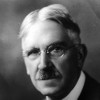“ Individuals do not even compose a social group because they all work for a common end. ”
John Dewey, Democracy and Education (1916). copy citation
| Author | John Dewey |
|---|---|
| Source | Democracy and Education |
| Topic | work group |
| Date | 1916 |
| Language | English |
| Reference | |
| Note | |
| Weblink | http://www.gutenberg.org/files/852/852-h/852-h.htm |
Context
“Persons do not become a society by living in physical proximity, any more than a man ceases to be socially influenced by being so many feet or miles removed from others. A book or a letter may institute a more intimate association between human beings separated thousands of miles from each other than exists between dwellers under the same roof. Individuals do not even compose a social group because they all work for a common end. The parts of a machine work with a maximum of cooperativeness for a common result, but they do not form a community. If, however, they were all cognizant of the common end and all interested in it so that they regulated their specific activity in view of it, then they would form a community.”
source


